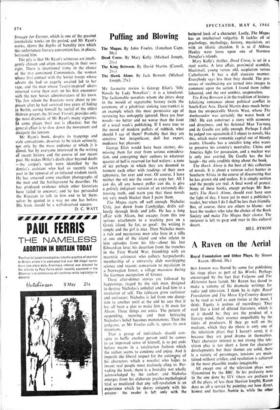Puffing and Blowing
MY favourite review is George Eliot's 'Silly Novels by Lady Novelists': it is a knockout. The fashionable novelists whom she inters deep in the mould of regrettable history (with the ceremony of a piledriver sinking tree-trunks) is an example which this most permissive age of reviewing has unhappily ignored. Here are four novels—no better and no worse. than the issue of a usual week's publishing. If I were true to the mood of modern puffers of rubbish, what should I say of them? Probably that they are sensitive but insignificant, dull but expert, mediocre but pleasant.
George Eliot would have been sterner, dis- missing them for ever from serious considera- tion, and consigning their authors to whatever quarter of hell is reserved for bad writers: a zone of ice perhaps in which they are doomed to torment each other with readings of their own ephemera, for ever and ever. Of course, I have neither the wit nor the room to copy her. All I can do, all any honest puffer can do, is give a politely indignant version of an extremely dis- tressing truth, and warn you that these novels are very much blacker than I paint them.
The Magus starts off well enough. Nicholas Urfe, just down from Cambddge, drifts cal- lously through birds and- Ws. He has a long affair with Alison, but escapes from this too ,serious attachment to a teaching post on a Greek island. So far, so good : the writing is simple and the girl is nice. Then Nicholas meets a rich and mysterious man who lives in a villa at one end of the island and who relates to him episodes from his life—about his lost Edwardian love; his desertion from the trenches in the First World War; friendship with an eccentric aristocrat who collects harpsichords; membership of a university club worshipping science and reason; conversion to mysticism in a Norwegian forest; a village massacre during the German occupation of Greece.
These after-dinner stories are followed by happenings, staged by the rich man, designed to destroy Nicholas's unbelief and lead him to a revelation of self. The tableaux grow curiouser and curiouser; Nicholas is led from one decep- tion to another until at the end he sees that it has all been a plot to make him a fit mate for Alison. Three things are amiss. The pattern of suspending, securing and then betraying Nicholas's belief becomes monotonous. Then the godgame. as Mr Fowles calls it, upsets its own intentions.
That a group of individuals should con- spire to baffle another person until he comes to an improved sense of himself, is to put ends before means in a totalitarian fashion which the author seems to condone and enjoy. And it imperils the liberal respect for the autonomy of his characters which a novelist who hopes to invent real people must zealously cling to. Per- vading the book, there is a brutality not wholly acknowledged by the author; and Nicholas emerges from his elaborate psycho-mythological trial so mutilated that any self-revelation is an experience which he shares uniquely with his creator : the 'reader is left only with the battered husk of a character. Lastly, The Magus has an intellectual vulgarity. It tackles all of psychology, mythology, history, mysticism, art with an idiotic abandon. It is as if Aldous Huxley were loose upon one of Norman Douglas's islands.
Mary Kelly's thriller, Dead Corse, is set in a steel works. A love affair, provincial scandals, blackmail, young versus old, scepticism versus Catholicism. It has a dull staccato manner. Everybody says less than they should. The pro- cesses of steelmaking are turned into images to comment upon the action. I found them rather laboured, and the rest sombre, suspenseless.
The King Between is in the tradition of history- falsifying romances about political conflict in South-East Asia. David Martin does much better than the unspeakable Morris West, whose The Ambassador was certainly the worst book of 1965. He can construct a story with economy and directness, and his fictional Mao Tse-tung and de Gaulle are jolly enough. Perhaps I shall be judged too squeamish if I object to novels, like this, which make romantic capital out of bloody events. Lhaodia has a socialist king who wants to preserve his country's neutrality; China and America fight for possession, and a nuclear war is only just averted. De Gaulle has the last laughthe only credible thing about the book.
The Hawk Alone is the best of this collection of novels. It is about a veteran safari hunter in Southern Africa in the course of discovering that he has grown old and useless. It is simply written and the people are real. A final word of protest. None of these books, except perhaps Mr Ben- nett's The Hawk Alone, should ever have seen the light of day. I have yet to meet a publisher's reader, but when I do I shall be less than friendly. But, of course, tl4re are others to blame: not least the readers who take the choice of the Book Society and make The Magus their choice. The reviewer is left to gasp and roar in this cultural desert.
BILL BYROM


































 Previous page
Previous page